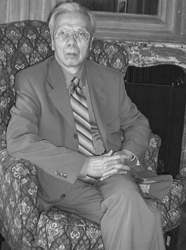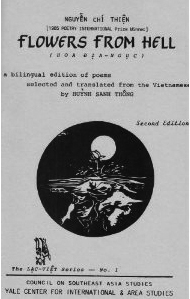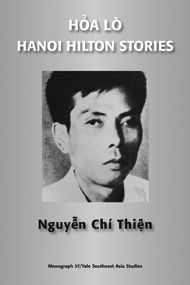Nguyen Chi Thien 1939 - 2012
 Nguyen Chi Thien was a dissident poet imprisoned in 1961 at age twenty-two by the Communist regime in North Vietnam. During the roughly fifteen years spent as a political prisoner in Vietnamese labor camps from 1960 to 1977, Nguyen Chi Thien composed hundreds of poems - edited, revised and stored entirely in his head. Released following the fall of Saigon, Thien delivered a manuscript of these poems to the British Embassy in Hanoi.
Nguyen Chi Thien was a dissident poet imprisoned in 1961 at age twenty-two by the Communist regime in North Vietnam. During the roughly fifteen years spent as a political prisoner in Vietnamese labor camps from 1960 to 1977, Nguyen Chi Thien composed hundreds of poems - edited, revised and stored entirely in his head. Released following the fall of Saigon, Thien delivered a manuscript of these poems to the British Embassy in Hanoi.
He was arrested at the embassy gate and taken to Hoa Lo - the well known "Hanoi Hilton" Prison, where he spent six of an additional twelve years of imprisonment, often in solitary confinement.
During this time, his collection of vivid poems, known as Hoa Ðia-Nguc began to circulate in two Vietnamese editions, and eventually overseas. Some of the poems were set to music and popularized by Vietnamese folksinger, Pham Duy. At the same time, his manuscript was making its way around the world, passed from hand to hand in Britain and the United States.
In 1984, a bilingual edition of the poems, translated into English by Vietnamese literature scholar Huynh Sanh Thong, was published under the title Flowers from Hell by the Council on Southeast Asia Studies at Yale University. In 1985, while it was still unknown if he were alive or dead, Thien was awarded the International Poetry Prize in Rotterdam on the basis of this book.
Thien was released from prison in 1991 and lived in Hanoi until 1995 when he emigrated to the United States. He became a U.S. citizen in 2004.
In 2007, the Yale Council on Southeast Asia Studies undertook publication of a collection of Nguyen Chi Thien's prose - Hanoi Hilton Stories - stories written about his years in Hoa Lo. Poetic testaments to the human spirit, this collection is further legacy of a great literary talent.
See: "Nguyen Chi Thien, Whose Poems Spoke Truth to Power, From a
Cell, Dies at 73," The New York Times October 8, 2012.

Hoa Ðia-Nguc / Flowers from Hell, by Nguyên Chí Thiên.
A bilingual edition of poems selected and translated by Huynh Sanh Thông 136pp.
(1984, Yale Southeas Asia Studies, Lac-Viêt).
978-0-938692-21-8 Paper $12.00
The English translation (and hand-drawn diacriticals in this bilingual publication) are by Huynh Sanh Thông, widely regarded as the preeminent translator of the poetry of Vietnam. Thông dedicated much of his life to bringing the achievements of Vietnamese literature and culture to western audiences. He was awarded the AAS Benda Prize in 1981, and was a 1987 recipient of a MacArthur Fellowship. (www.yale.edu/seas/HSThong.htm)
"What is memorable in these poems is the quality of the anger, the apocalyptic vision, the survival of dreams, hope, and love, the minute observation of prison life, and above all, the survival of poetry in Nguyen Chi Thien....for this tragic man, poetry was no luxury - it was the staff of life."
-James C. Scott, Sterling Professor of Political Science and Anthropology, Yale University
My poetry's not mere poetry, no,
but it's the sound of sobbing from a life,
the din of doors in a dark jail,
the wheeze of two poor wasted lungs,
the thud of earth tossed to bury dreams,
the clash of teeth all chattering from cold,
the cry of hunger from a stomach wrenching wild,
the helpless voice before so many wrecks.
All sounds of life half lived,
of death half died - no poetry, no.
 Hoa Lò: Hanoi Hilton Stories, by Nguyên Chí Thiên.
Hoa Lò: Hanoi Hilton Stories, by Nguyên Chí Thiên.
Translators: Nguyen Ngoc Bich, Tran Van Dien, Vann Saroyan Phan and Nguyen Kiem Phong. 296 pp. (2007, Yale Southeast Asia Studies Monographs).
978-0-938692-88-1 Library Cloth $37.00; 978-0-938692-89-8 Paper $25.00
"Totalitariansm creates hell on earth. In Nguyen Chi Thien, that hell has found its Dante. 'Hoa Lo/Hanoi Hilton Stories' is a tribute to the power of the human spirit over tyranny and of art over oblivion."
-Michael Lind, Senior Whitehead Fellow, the New American Foundation, Washington DC
"The austerity, menace, and extremity of long imprisonment under conditions that are calculated to defeat the spirit and body have the capacity to produce great literature....a magical blend of...close observation of one's constrained surroundings and of one's interior life together with the lyricism that hopeless situations can, paradoxically, produce."
-James C. Scott, Sterling Professor of Political Science and Anthropology, Yale University
See www.yale.edu/seas/Publications for additional information on these and
other publications of the Council on Southeast Asia Studies at Yale University